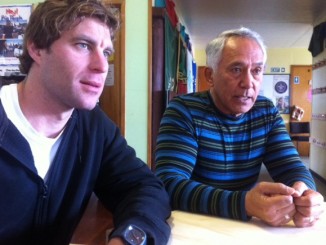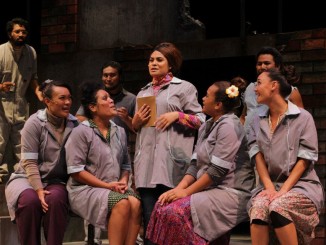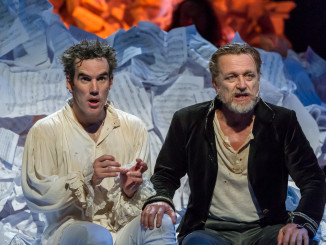Honestly, Iago… [by James Wenley]

It might be called Othello, but this one is very much Iago’s show.
Iago, the villain in Shakespeare’s Othello, has long threatened to outshine the titular tragic hero. Shakespeare for one gave him substantially more lines and a relentless destructive driving force, plotting to destroy the Moor that he says he hates. Why Iago does what he does has forever been debated by the academics, and his motivations make him a continually fascinating character, an interpretative draw card for directors and the actors who play him. This is not to diminish Othello’s story, rich in its own issues of identity, difference and the tragic fall, but Iago is far more fun. Especially, in Jesse Peach’s production.
Matt Minto, best known here for his stint on Shorty Street as Dr. Isaac Worthington, delivers a great Iago. He is charming, witty, sardonic and startlingly funny. Appealing perhaps to some of our more twisted instincts, a good deal of the audience was delighting in his wicked scheming and how easily characters Roderigo and Othello could be fooled. Minto’s Iago manipulates the audience just as hard as the characters onstage. Minto is particularly adept at showing us Iago’s thought processes, his brain ticking away as he formulates and adjusts his plans on the fly based on what’s he’s presented with.
The play flies through the action, Peach working with dramaturge Alan Jones to streamline the play, removing extraneous characters and dialogue (as often happens with today’s need to cater for restless audiences and budgets that don’t stretch to including a full ensemble). A non-Shakespeare text introduction clearly outlines the backstory of the play – how Iago was passed over for General Othello’s number two in favour of Cassio, and the simple statement that “Iago hates the Moor”. Act One is much reduced, as is Two, the focus firmly on the ‘honest’ Iago. Indeed, with the cutting, the rest of the players seem mere instruments, chess pieces to be moved, muted in comparison to Iago’s vibrancy. In a clever design and directorial solution, these characters are trapped, frozen in beams of light as Iago speaks directly to us with his famous soliloquies. It’s a legitimate and interesting way for Peach to tackle the play, but I did feel like we lost some of Othello’s story, lessening our care for what happens to him and his doomed love Desdemona later down the track.
Othello finally begins to step out of Iago’s shadow when he intervenes in the fight between Cassio and Lodovico (which Iago had naturally engineered). Robbie Magasiva’s Othello is a powerful figure; proud and dangerously quick to anger, with an underlying wisdom that fails him. Magasiva invests Othello’s fall with a deep believability, the two-hander scenes between Magasiva and Minto are electric, and Magasiva is frightening when the ‘green eyed monster’ has fully taken over.
The racial issues in the play, though very much accounted for in Iago’s speech (“an old black ram..”), do not seem to get an overt treatment in Peach’s production. There is however an interesting implication with the casting of Maori actor George Henera as Desdemona’s father Brabantio, who second only to Iago objects most vehemently against Samoan Magasiva’s Othello. Othello’s position and issues seem less to do than the colour of his skin, and more a question of cultural difference.
Peach has collaborated on this production with creative icons Douglas Wright (Choreographer) and Gareth Farr (composer), who have created a sound and movement vocabulary that adds something beyond the scope of traditional Shakespeare. Wright’s distinctive choreography is particularly interesting, sometimes revealing new layers to a character’s psychology, at other times thoroughly confusing me. The action and dialogue would stop, and a character would begin to dance, seemingly in a manifestation of their particular psychological state. A dark foreshadowing duet between Othello and Desdemona on their marriage bed opens the show, Othello’s black vest consuming her. Emilia (Olivia Tennet) is given a wonderful moment as she decides whether to obey her husband Iago and take Desdemona’s handkerchief, picking it up in her teeth like a dog. The best use of Wright is at the end, where Othello’s famous final speech (“a word or two before you go”) is physicalised beautifully and sadly by Magasiva, conveying his final torment in a way more powerful perhaps than even Shakespeare’s text.
Not all of it worked for me; Henare’s dance after losing his daughter, where he punches himself, was a little too strange too soon. I felt the movement work could have been integrated more fully throughout the play; there was an interesting section where Roderigo does a ‘Peacock’ dance around a frozen Desdemona as he speaks his Shakespeare, but mostly the dance seemed to exist removed from the text. It feels like Peach and Wright have only just begun to explore this form and the implications for a Shakespearian work, and there is much further to push.
Peach has cast this one well, mixing theatre veterans and fresher faces. George Henare makes an early if brief impression as Brabantio, though I enjoyed watching him even more as part of the ensemble, shining with full commitment and energy, as did fellow veteran Ken Blackburn in a variety of parts. Younger actors Matt Walker, Gypsy Kauta, Ciarin Smith and Kevin Keys all excel with their turns. Morgana O’Reilly’s Desdemona was a curious one; feisty, strong, and guarded with her affections, hers was a Desdemona I could almost imagine to have done what she was accused. She plays her last scene heartbreakingly well, her death traumatically effective. Like Iago overshadowing Othello, OIivia Tennet’s Emilia proved a more fascinating character than Desdemona. Emilia, who Iago tells us early on may or may not have already been bedded by Othello himself, is played with great complexity by Tennet who gives us hints (together with Wright’s previously mentioned choreography) of a rich interior life, and we wonder about her.
Emily O’Hara’s costumes are part contemporary dance gear (black vests and tights), part evocations of Shakespearean dress. While allowing the actors to move freely, I didn’t feel the look was aesthetically successful. Matt Walker’s Cassio looked particularly ridiculous in a tight black vest and large pantaloons. Together, they seemed incongruous, the design work perhaps needing to choose to go with one of the extremes. O’Hara’s set is more successful, a foreboding playing space with many doors, the perspective retreating to the back of the stage. It’s complimented by Rachel Marlow’s lighting design, which catches the ever present smoke rising from the wings.
Peach continues to mature as a director, and this production is a genuinely fresh take on the oft-performed play. There are some odd choices: the bodies of Roderigo and Brabantio being laid on the sides of the final scene doing more to distract from than illuminate the action, and some oddly brilliant choices: Emilia’s handkerchief dance. The storytelling, particularly Iago’s plots and the business with the handkerchief, is very clear, and I suspect that it would play very well to people without a working knowledge of Shakespeare. Robbie Magasiva is as we have never seen him before, but Matt Minto’s Iago leaves the lasting impression. He corrupts us just as thoroughly as Othello – this production’s masterstroke.
Othello is presented by Peach Theatre Company and plays at the Maidment Theatre until 13 August 2011.
More information at the Maidment Theatre Website.




Leave a Reply